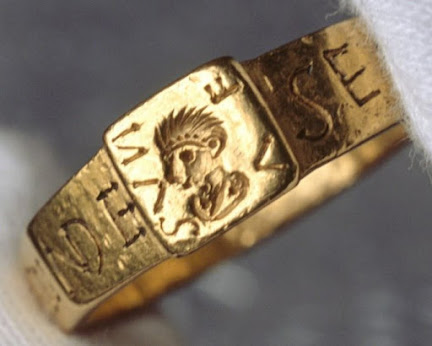Although this contains a typo and some sketchy grammar it essentially says: "Seniciane lives in God". It is the sort of saying that was current in early Christian communities in the 4th century AD, which is the presumed date of the ring.
There is no actual documentation that Tolkien ever saw the ring or knew about it, but he was both very erudite and a bit closed mouth about his work, so....maybe. But he does factor into the story.
In the early 19th century, and about a hundred miles from where the ring turned up, a "Curse Tablet" was found. These are folded up bits of lead with an inscription on them. Usually you'd hire someone to fashion it, dedicate it to a god, and leave it in a sacred place. This one reads:
For the god Nodens. Silvianus has lost a ring and has donated one half [its worth] to Nodens. Among those named Senicianus permit no good health until it is returned to the temple of Nodens
Here's a sketch of the tablet.
Note the name Senicianus. Silvianus sure thought he'd swiped a ring, and for it to be a matter of importance it sure would not have been a bronze trinket. The inscription on the band would be new, but the rest would probably be original.
Tolkien was consulted on the collection of artifacts that included this tablet, and wrote a detailed report, particularly with regards to what sort of deity Nodens was. He did not mention the ring, but the man who commissioned the study was aware of it and I think would have mentioned it.
It's an interesting theory. Is this where JRR got the idea of a ring that would be a curse to those who stole it? And of course from the perspective of Sauron, all future possessors of The Ring would have been thieves.
As theories go it is nice and neat. Too neat. Senicianus apparently was a fairly common name in 3rd century Brittania. It even turns up on other curse tablets! And Tolkien - remember he was not a particular fan of Roman stuff - was said to be more influenced by Nordic sagas in which cursed, magical rings - occur. And perhaps by The Ring of Gyges, as mentioned by Plato. It was also magical and gave its owner the power of invisibility. I don't think the Silvianus ring does that, but I do note that there do not seem to be any photos of museum curators trying it on!
For a more scholarly look at the tablet and ring question I refer you to one of my erudite excavation colleagues who runs a site on the Roman Inscriptions of Britain. He thinks there is no link.
One final thought. The Ring of Silvianus is unusual in that it is too large to wear on a normal finger. It seems to have been designed to wear over a gloved hand. Odd.....and if Peter Jackson's writing and research people knew about this artifact and worked it into the movie, well, I salute them.



No comments:
Post a Comment